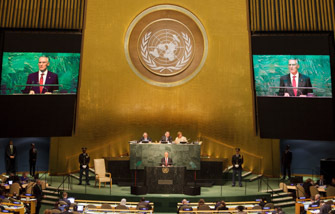
Secretary of State,
Ambassadors,
I start by thanking you for having accepted my invitation for this informal meeting with the Ambassadors of the countries of the European Union accredited in Lisbon, and with the local Representatives of the European Institutions.
Allow me to address a special greeting to the Spanish Ambassador, whose country assumes the Presidency of the Council at a particularly demanding time for the European Union.
We are at the beginning of a week during which another Europe Day will be celebrated, and a little more than a month before the date of the 25th anniversary of the Adhesion Treaties of Portugal and Spain.
These are highly symbolic dates and, for this reason, particularly appropriate for a reflection on the current times and on the routes to be taken by the European Union.
This is what I propose you should consider.
Throughout my political life I have had the opportunity to take part in several European Councils, many of them of remarkable standing in the recent History of the European Union. And I had the honour to be at the head of my country’s Government during the first ten years of its adhesion.
From this experience resulted my firm conviction that a united Europe is the best way to assert the interests in the economic and social development of our Peoples and to promote the international averment of each of our States.
This route and these convictions leave me in no doubt that the process of European integration faces, today, some of the biggest challenges it has ever had to meet.
Let us have no doubts: the validity of the European Union is being tested.
How we will be able to respond to the tests we are facing will determine what the European Union will become in the future: whether a project wounded in its essence or, on the contrary, a project strengthened by the capacity demonstrated to meet the difficulties and overcome them.
The last few months have been fertile in lessons. It is important to know how to draw the respective inferences.
The Economic and Monetary Union is one of the most important undertakings of European integration.
The success of the Euro is fundamental for Europe’s future in a global world.
There is no room, none can be made, for retreats relative to the Euro, because the costs would be unendurable, would compromise the economic and social progress of all the Europeans and the credibility of the European construction itself. The only path, thus, is to face the difficulties jointly, with determination, responsibly and with solidarity.
Sense of responsibility of the Member States facing budgetary situations of concern for the whole of the Union. But also of the remaining States, who should correspond constructively and with solidarity, with the efforts to correct the unbalances and the difficult sacrifices imposed by it.
The agreement over the financial aid package for Greece will, under this point of view, constitute good news for Europe and even for the international community. It will also be the proof that the values of responsibility and solidarity, already appealed to in the Schumann Declaration over fifty years ago, are still kept alive.
We must be responsible and maintain solidarity. Only thus will we be credible.
The European Union is also under test in another area; that of the operation of its institutions, following the changes introduced by the Treaty of Lisbon.
The recent developments have brought about still greater relevance for the fast and effective implementation of the Treaty of Lisbon.
To the urgency in the challenge to ensure the stability and credibility of the single currency are added the many other fundamental issues for us to meet the legitimate expectation of our peoples.
These are challenges that demand European Institutions capable of acting quickly, effectively and with transparency.
We shall have the opportunity, during lunch, to approach this and other themes.
I wish to end with a word of confidence in the future of the European integration project, in the future of the European Union.
Many of the problems and challenges we are facing are a consequence of the success of our project, of what it produced and of the expectations it generated.
I am certain we will be able to overcome these further challenges and that the European Union will arise strengthened, more cohesive and better prepared to act in concert and to guarantee a better future for the Europeans.
Thank you very much.
© 2006-2016 Presidency of the Portuguese Republic
You have gained access to the records of the Official Site of the Presidency of the Republic from 9 March 2006 to 9 March 2016.
The contents available here were entered in the site during the 10 year period covering the two mandates of President of the Republic Aníbal Cavaco Silva.